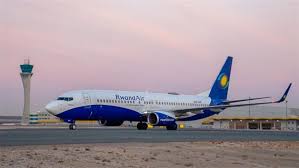RwandAir has announced adjustments to its flight paths following the Democratic Republic of Congo (DRC) airspace closure to Rwandan-registered aircraft. The move, linked to the ongoing conflict in Goma, North Kivu Province, has disrupted air travel between the two nations and prompted airlines to make immediate operational changes.
In response to the restriction, RwandAir stated that it has rerouted affected flights to ensure continued operations while prioritizing passenger safety. The airline reassured customers that it is working on the most efficient alternatives to minimize disruption. However, the ban significantly impacts RwandAir’s connectivity within the region, given that the DRC is a key market for the airline.
The airspace closure was first reported on February 11, based on an internal memo from the DRC’s airport authority. According to the Agence Congolaise de Presse (ACP), the directive prohibits all civil and state aircraft registered in Rwanda, as well as those based in Rwanda but registered elsewhere, from entering Congolese airspace. The restriction comes as tensions escalate between the two nations, with the DRC government accusing Rwanda of supporting the M23 rebel group a claim that Rwanda denies.
Following the announcement, the DRC Civil Aviation Authority (AAC-RDC) issued a Notice to Air Missions (NOTAM), indicating that Goma International Airport would remain closed until May 11, 2025. The conflict has created significant aviation risks, prompting the UK Civil Aviation Authority (UKCAA) to issue a warning on February 12. The UKCAA advised airlines to avoid airspace within 200 nautical miles (370 km) of the DRC’s eastern border below 25,000 feet due to potential threats from anti-aircraft weaponry in the conflict zone.
The restriction extends across the eastern DRC, affecting areas near Rwanda, Uganda, and Burundi. As a result, several airlines, including Ethiopian Airlines, Jambojet, and Astral Aviation, have suspended flights to Goma.
The continued closure of Goma International Airport has raised humanitarian concerns, as relief agencies rely on air transport to deliver aid to conflict-affected areas. Humanitarian organizations have urged the DRC government to reconsider the ban, particularly to facilitate medical evacuations and supply deliveries. The conflict has already claimed approximately 3,000 lives, according to UN reports, and the worsening humanitarian crisis underscores the urgency of reopening essential air routes.
Beyond the humanitarian impact, the closure of DRC airspace poses economic challenges for regional trade and travel. RwandAir, which serves key destinations across Africa, the Middle East, and Europe, faces potential revenue losses due to the rerouted flights and increased operational costs. The airline may also experience a decline in passenger traffic due to travel disruptions.
The airspace restriction is the latest development in ongoing tensions between Rwanda and the DRC. Diplomatic efforts to de-escalate the conflict remain critical, as regional stability is essential for trade, security, and aviation operations. Regional bodies, including the African Union and the East African Community, have called for peaceful resolutions and negotiations between the two nations.
The closure of DRC airspace to Rwandan-registered aircraft presents a significant challenge for RwandAir and the broader aviation sector. While the airline has implemented alternative routes, the long-term impact of this restriction will depend on diplomatic developments and conflict resolution efforts. In the meantime, humanitarian organizations and industry stakeholders continue to push for the reopening of vital air corridors to ease the suffering of affected communities and restore normal operations in the region.

